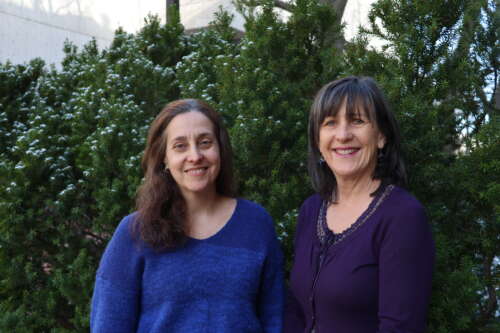A new community-engaged research project at the University of Guelph endeavours to learn more about gender-based violence and the impact of housing instability on the women and families experiencing it.
Co-led by Dr. Paula Barata, professor in the Department of Psychology and Dr. Mavis Morton, professor in the Department of Sociology and Anthropology, the Safe and Stable Housing through Intentional Partnership project (SSHIP) is a starting point to connect academics, community-based service organizations and survivors to better understand and address the crisis of housing insecurity and homelessness.
The challenge of gender-based violence reflects the method the team is using to address it – neither is an individual concept.
“To get at this in a preventative way,” Morton says, “we’ve got to look at the structures, systems and culture that reinforce gendered power at an institutional level.”
How a national housing crisis impacts the most vulnerable
Amidst a national housing crisis, women experiencing and fleeing violence are significantly impacted. According to WomanACT, one of the project partners, 30 per cent of Canada’s homeless population are women and 91 per cent of them have experienced some form of violence or assault.

“We know that housing is related to violence and that not having appropriate housing causes violence and violence causes homelessness,” says Barata, adding that for women in rural or Indigenous communities, access to resources like shelters can be even more challenging.
SSHIP follows a sociocracy model, a framework for working together. As community-engaged scholars, Barata and Morton’s work shares many of the same principles – partnership, equity among collaborators and diverse perspectives.
“This ensures everyone’s voice is heard, that we’re incorporating different perspectives and developing governance to make the process efficient,” Barata explains.
The project is supported by a Partnership Development Grant from the Social Sciences and Humanities Research Council (SSHRC), funding that is designed for this type of collaboration.
“We really need their wisdom and expertise,” Morton says of the project’s community partners, “so that we develop these things in ways that make sense for their organizations and the women they serve.”
The project is organized into three areas including project governance development, data collection and knowledge translation.
Together, with postdoctoral researcher Daniely Sciarotta, Barata and Morton will collect data from survivors, executive directors of homeless and violence against women shelters and their staff.
Their goal is not just to add to existing research, but to have a positive impact, gathering information that makes a case for improvement among sectors. “We can only do that working together with the folks on the ground,” Barata says. “Bringing those three different components together is critical to see the bigger picture.”
Helping women in need in Guelph, Sarnia and Toronto
In Canada, the women’s shelter movement only began in the 1970s and was a grassroots movement by women, for women and children experiencing violence. As a result, different organizations and ministries with different resources developed with different missions and mandates and different funding. “It’s been a bit of a patchwork,” Morton says.
Connecting women’s homeless shelters with violence against women shelters is a central focus of the project. These organizations are struggling to serve a multitude of needs that include poverty, mental health, substance use, physical and brain injuries in addition (and contributing) to housing instability.
“There are not enough resources and there is not enough housing, but it’s far more complex than that,” Barata says. “Ultimately, we want to be able to show this complexity.”
To illustrate a cohesive picture, the project will begin with three Ontario sites: Women’s Interval Home of Sarnia-Lambton, representing a rural environment; Guelph-Wellington Women in Crisis, representing a midsize municipality; and Women’s Habitat in Etobicoke, representing a larger, more diverse and urban population.
Other collaborators include the Ontario Association of Interval and Transition Houses, Lindsey Thomson and Elizabeth Jackson of the Community Engaged Scholarship Institute at U of G, Dr. Christine Wildman of the Centre for Research and Education on Violence Against Women and Children at Western University and co-founder of WorQshop: Building Safer Spaces, Dr. Erin Dej of Wilfred Laurier University’s Department of Criminology, Dr. Kaitlin Schwan of the University of Southern California’s Keck School of Medicine, Dr. Melissa Tanti of Coventry University.
Contact:
Dr. Paula Barata
pbarata@uoguelph.ca
Dr. Mavis Morton
mortonm@uoguelph.ca
